Student and Alumni Highlights
Student Spotlight: Medical Biology Major Vanessa Belizaire
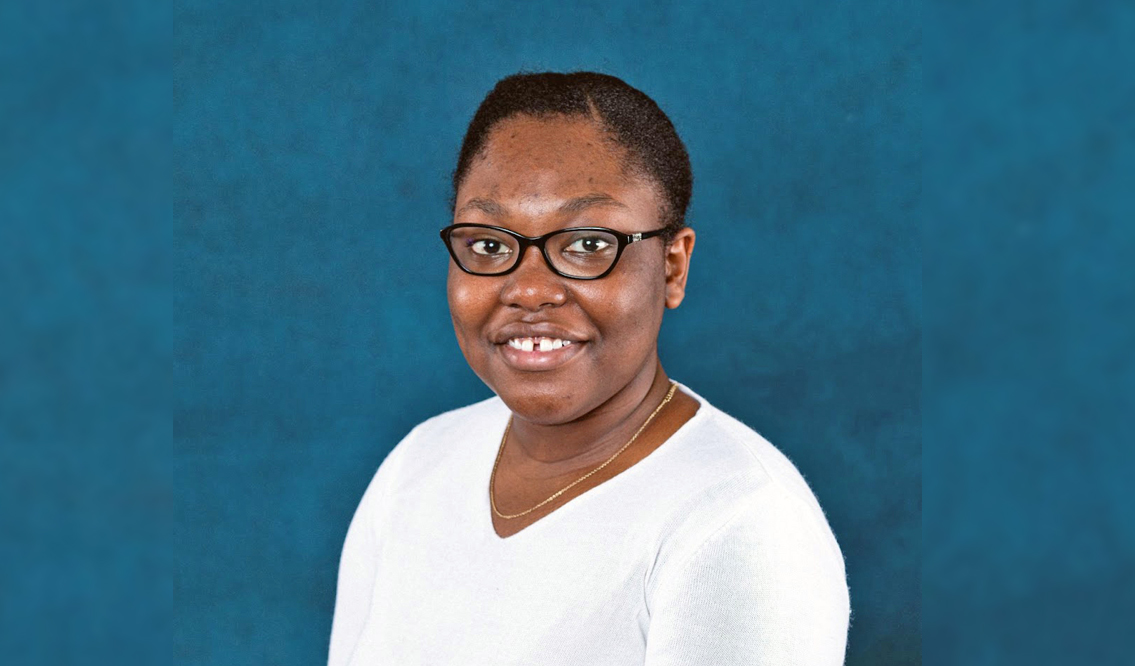
Vanessa Belizaire is embarking on her second year in the Schmidt College of Science’s new medical biology degree program.
Vanessa Belizaire is embarking on her second year in the Schmidt College of Science’s new medical biology degree program. Belizaire, who was also recently named a Florida Atlantic University (FAU) Schmidt College of Science Soar-in-4 Scholar, chose the program because it offers a background in both research and medicine.
“I am very interested in both research and medicine, and I wanted to have the opportunity to experience both during my undergraduate years before I make a final decision about graduate school,” Belizaire explained.
FAU’s Bachelor of Science in Medical Biology is a rigorous, streamlined, pre-professional program unique in southeast Florida that will enable students to pursue competitive professional training programs in the health sciences. This program is tailored for students who seek entrance into top-tier schools in the fields of medicine, veterinary science, pharmacology, and more.
The first-generation student said that she was grateful to FAU’s Pre-Health Professions team for helping her select classes. “Choosing classes can be overwhelming,” Belizaire said. “They also prevent me from getting my schedule too full so that I won’t overwork myself.”
In the coming months, she expressed her enthusiasm about joining student organizations, beginning a research project, and forming relationships with faculty members and her peers.
So far, Belizaire’s favorite thing about Florida Atlantic is its culture of inclusion. “It’s nearly impossible to distinguish who is a senior and who is a freshman at FAU,” she said. “That makes it easy for a first-generation college student like me to blend in and fully embrace the college experience.”
Belizaire anticipates that she will graduate in the summer of 2025.
Learn more about the College’s Bachelor of Science in Medical Biology degree program.
Student Spotlight: Soar-in-4 Scholar Jorge Torres
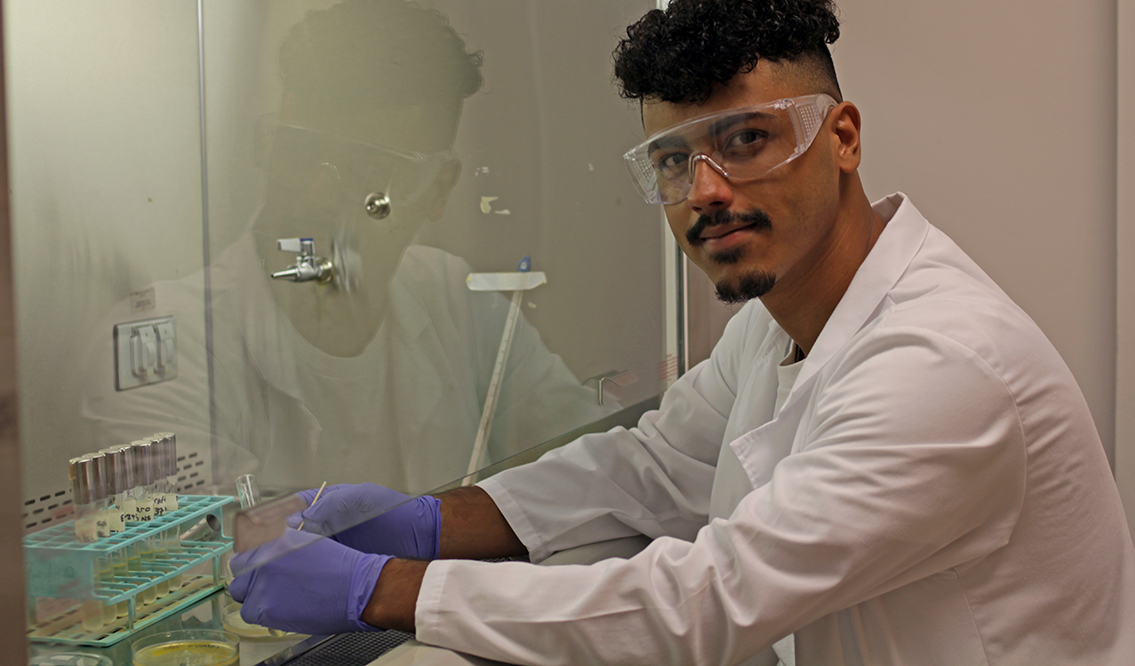
Jorge Torres is a pre-medical track student working towards a B.S. in Biological Sciences, and is a member of the Tiny Earth Lab, researching antibiotic producing bacteria found in the soil. He is also a member of the Soar-in-4 program.
Student Spotlight: Soar-in-4 Scholar Jorge Torres
August 2021
Jorge Torres is a pre-medical track student working towards a B.S. in Biological Sciences and a member of the Tiny Earth Lab, researching antibiotic-producing bacteria found in the soil. He is also a member of the Soar-in-4 program that provides high-achieving students with research opportunities, mentorship, and much more.
Why did you decide to come to FAU and choose a degree program in science?
I was attracted to the campus facilities and impressed by the cultural diversity. It has been a very fun journey. I was first introduced to the Tiny Earth Lab by a fellow student and with the help of my mentor, Dr. Evonne Rezler, who helped me join Tiny Earth in the Spring of 2021. At first, it was a lot to take in as I did not have any formal research experience, but with the help of my fellow researchers and guidance from the lab’s director, Dr. Diane Baronas-Lowell, I quickly learned many valuable skills that helped me succeed in the lab and in my classes.
What type of research are you performing alongside Dr. Diane Baronas-Lowell?
I am performing antibiotic discovery research. The goal of this research is to discover antibiotic-producing bacteria from the soil, educate students about the antibiotic crisis, and engage in original scientific research.
What is your interest in this type of research?
I chose the Tiny Earth Lab because I want to bring awareness to the antibiotic resistance crisis. I believe that bacterial antibiotic resistance is a world threat that is not well-known by the general public and will have devastating consequences in the future if it is not addressed soon.
What has your experience been as a Soar-in-4 Scholar in the college, and how has this program helped you along the way?
Amazing! The Soar-in-4 Scholars program has provided me with support, guidance, and encouragement which will allow me to graduate earlier than expected. The one-on-one mentorship and networking opportunities have helped me succeed in the academic arena. Thanks to this program I have developed what I hope to be long-lasting relationships with fellow students and advisors alike.
Tell us about the clubs or student organizations you are involved with.
I am the Vice-President of Global Medical Brigades and the Treasurer for Pre-Health Ambassadors.
My involvement in these organizations has enhanced my research by expanding my knowledge of various topics that are related to my field. The subject matter in Tiny Earth is a worldwide issue and with my involvement in Global Medical Brigades, I will be able to help third-world countries that are heavily affected when a health crisis arises by providing medical support and relief. My involvement in these organizations has also enhanced my time here at FAU by helping me develop leadership skills, build relationships, and expand my involvement in campus affairs.
What do you like best about being at FAU?
The student diversity! I have a passion for learning about other cultures and when I arrived at FAU I was pleasantly surprised by the diversity of cultures among students and staff. I have learned that there are many students at FAU from all different cultures and walks of life.
What career or academic pursuits are you interested in after you graduate?
After I graduate I intend to attend medical school and become a physician. FAU provided me with a strong academic program in science which will be the foundation for my medical career.
Student Spotlight: SEA Scholar Sammy Trail
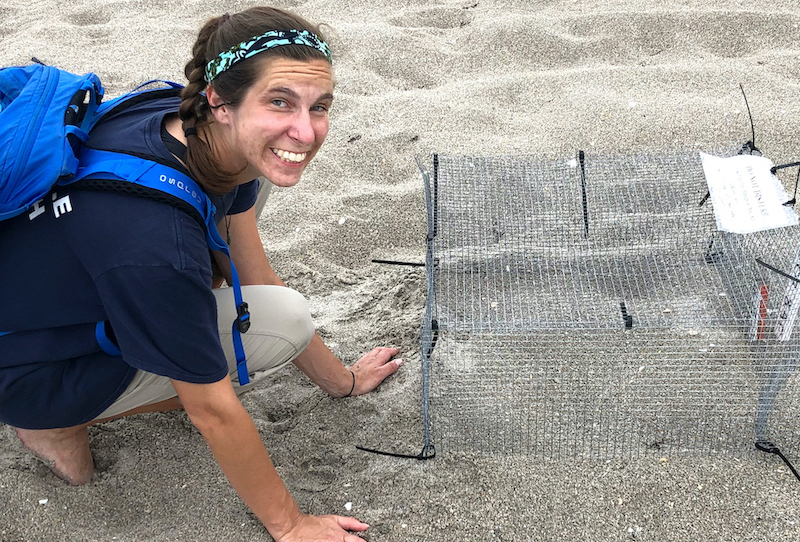
Sammy Trail, is a graduate student pursuing her M.S. and Ph.D. in integrative biology, and a SEA Scholar working in the Department of Biological Sciences Marine Science Laboratory.
Sammy Trail, is a graduate student pursuing her M.S. and Ph.D. in integrative biology, and a SEA Scholar working in the Department of Biological Sciences Marine Science Laboratory. Sammy is part of The Glenn W. and Cornelia T. Bailey Marine SEA Scholars (Science, Education, and Art) program that provides awards to students who demonstrate academic excellence and a commitment to become ambassadors of community outreach focused on FAU Marine Research Lab studies and activities. Sammy works with research professor Michael Salmon, Ph.D., and professor Jeanette Wyneken, Ph.D.
Why did you choose FAU?
I was excited about the opportunity to take part in top-notch research, learn from world-renowned experts in the field, while still having an emphasis on sharing my research with the community (i.e., having a lab that is open to the public at Gumbo Limbo's Environmental Complex).
What are your research interests?
My research interests lie at the intersection of sensory biology and behavior, specifically as they relate to movement. My current thesis investigates the spectral sensitivity thresholds of leatherback sea turtle hatchlings during their initial crawl from the nest to the water and the corresponding crawling behaviors that occur in this species more than others. As I transition to my Ph.D. work, I hope to venture into the larger-scale movements of these great migrants once they enter the water and potentially investigate the sensory cues they use to navigate during that time.
What do you like best about being at FAU?
At FAU, I enjoy being surrounded by other curious people every day. I enjoy having a pulse on the goings-on of the sea turtle research community with one of the most densely nested sea turtle beaches right in our South Florida backyard. And I enjoy the collaborative effort of the FAU Marine Lab to give our science a broader audience.
What career are you interested in after you graduate?
I hope to become a university professor. As a former middle school teacher, I can't think of a better career path to combine my love of teaching, mentorship, and science research.
Student Spotlight: Undergraduate Researcher Jinelle Vazquez
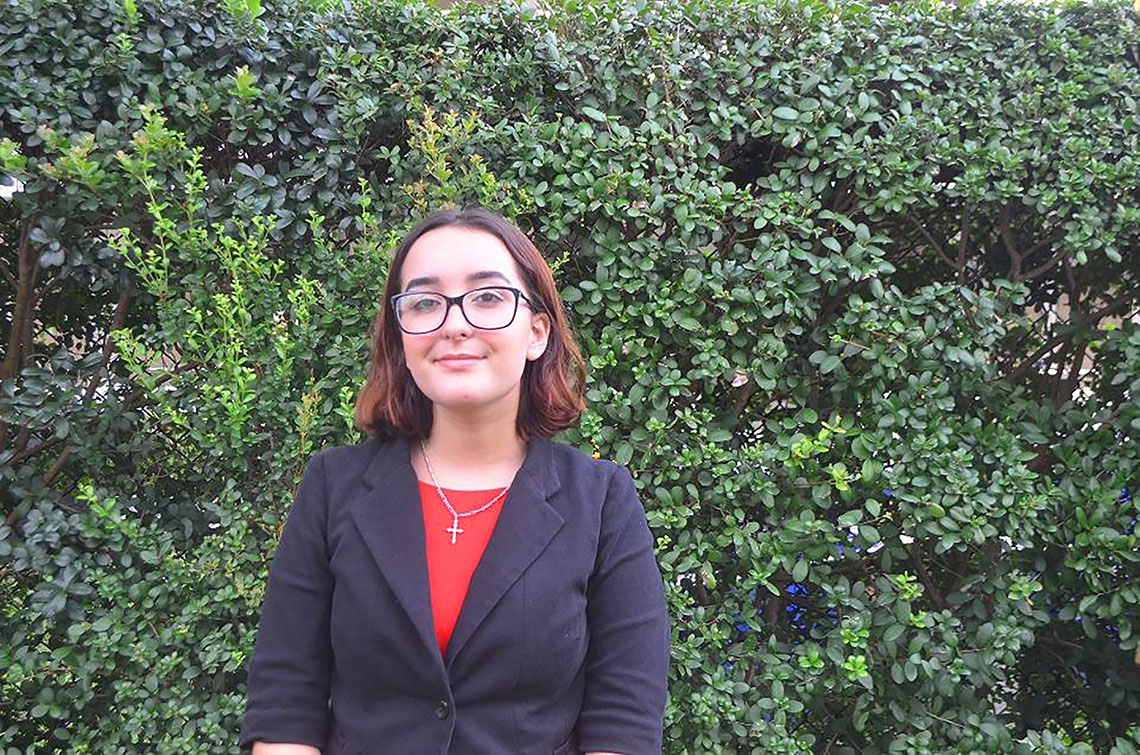
Jinelle Vazquez is a Senior at FAU High School pursuing a Biology major and Psychology minor. She currently works with Teresa Wilcox, Ph.D. in the Infant Cognition Lab.
Pursuing a B.S. in Biological Sciences and a minor in Psychology, Jinelle Vazquez, a Senior at FAU High School, works with Teresa Wilcox, Ph.D. in the Infant Cognition Lab.
What are your research interests?
In my lab, we are interested in infants' cognitive and perceptual abilities. To be specific, we are interested in the development of social cognition resulting in the study of how infants process various social cues such as facial expressions and communicative gestures and how infants use information from social versus mechanical informants.
What do you like best about being at FAU?
What I like best about FAU are the opportunities I have been able to partake in because of the amazing faculty members and students that I have become close to. With such a strong support system, I have been able to reach out of my comfort zone and do things I have only dreamed of such as becoming Sergeant-at-Arms for the American Medical Student Association and President of Pre-Health Ambassadors.
What career are you interested in after you graduate?
After completing my undergraduate career, I would like to pursue a Master's in Public Health before applying to work in the Peace Corps or in a non-profit organization. My goal with this is to gain real-world volunteer experience before applying to medical school.
Student Spotlight: Undergraduate Researcher Lina Crisostomo
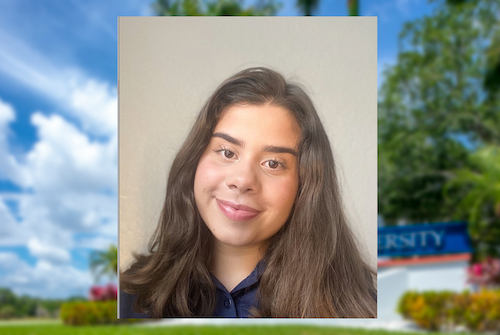 Lina Crisostomo is a Biological Sciences major and Health Administration minor in the College of Science who is on the pre-health track student, aiming to go to medical school and become a physician.
Read more
Lina Crisostomo is a Biological Sciences major and Health Administration minor in the College of Science who is on the pre-health track student, aiming to go to medical school and become a physician.
Read more
Lina Crisostomo is a Biological Sciences major and Health Administration minor in the College of Science who is on the pre-health track student, aiming to go to medical school and become a physician. Cristosomo has held leadership roles in student groups and is a member of the college’s Soar-in-4 cohort of high-achieving students, as well as the Undergraduate Research Training Initiative for Student Enhancement (U-RISE) program funded by the National Institutes of Health. The U-RISE program promotes diversity in biomedical science, by engaging students in a customized research-intensive undergraduate experience.
Crisostomo describes her experience as an undergraduate researcher, “During your first year working with U-RISE you work with the Principal Investigators who and graduate students in their lab. I started working with Alex Keene, an associate professor of biology, on the Jupiter campus this fall. I work with him and his team on cavefish studies.” She is specifically working on how cavefish respond to a stimulus, to determine their “startle response.” The cavefish evolved in an environment void of light, and because of this life with no sunlight, they are blind and respond differently compared to the same species of fish who do not live in caves.
“We are at the initial stages of our study to learn about the stimulus responses of cavefish. It’s amazing working with Alex and his team. I am thrilled to be working in the U-RISE program, which creates a community with the students and researchers in the programs,” says Lina.
Part of Lina’s involvement at FAU included serving as associate director for SAVI (Students Advocating Volunteering Involvement) in the summer of 2020. Lina remarks, “It was an amazing experience and I learned a lot about volunteer programs, leadership, and getting involved.” Crisostomo was also a member of the American Medical Student Association and the Health Occupations Students of America.
“The Soar-in-4 program is great. I met other students on the same path, and we help each other out, and support each other on this journey to medical school,” Lina shares. She goes on to say, “Fellow students have been super motivating and we even have Zoom calls to check in on each other and share opportunities. There is a strong sense of community, everyone’s determined, with a great work ethic, even though this can be a competitive environment when you are on your way to medical school. I am really happy to be part of this group.”
Lina shares her thoughts on the Pre-Health Office, who supports her each step of the way, saying, “The Pre-Health advisors are not just advisors, it’s not just about the classes I take, they truly care about my success, and really helped with my journey. They help me meet milestones and goals for medical school, and it’s really nice to feel that support. They have the end-goal in mind, and it’s nice to feel supported and have that team to provide helping hands.”
Alumna Betsy Evans Leading the Way as Vulture Research Biologist
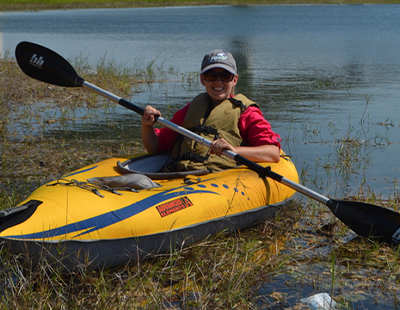
Betsy Evans is a Summer 2020 graduate of the Integrative Biology Ph.D. program in Environmental Science. Evans served as lead author on a study on wood storks, which was recently published, titled, "Urban food subsidies reduce natural food limitations and reproductive costs for a wetland bird."
Betsy Evans is a Summer 2020 graduate of the Integrative Biology Ph.D. program in Environmental Science . Evans served as lead author on a study on wood storks, which was recently published, titled, "Urban food subsidies reduce natural food limitations and reproductive costs for a wetland bird." She is currently employed by the U.S. Army Corps of Engineers in Jacksonville, FL, and will then transition to her role as a Vulture Research Biologist with the U.S. Department of Agriculture (USDA) in Gainesville, FL starting September 27. Read more about Betsy's recent study.
 Tell us about your new position
Tell us about your new position
I work with a multi-agency team of scientists, planners, and resource specialists who organize and apply scientific and technical information in ways that are essential in supporting the objectives of the Comprehensive Everglades Restoration Plan (CERP). I work as a RECOVER (REstoration COordination & VERification) Greater Everglades Regional Coordinator for the US Army Corps (USACE). I recently led the Interim Goals and Targets effort to RECOVER. Interim Goals and Targets are used to assess the incremental progress of CERP. Click here to view the report (if interested!).
I will coordinate and lead vulture management research for the southeastern United States as part of the USDA.
How did FAU help prepare you for this role?
My FAU Everglades research experience provided me with the first-hand experience of the research being conducted for Everglades restoration. My position at USACE was to coordinate and coalesce the data that is being collected from FAU and other state universities. Having first-hand experiences at FAU collecting and analyzing this data provided me with an invaluable understanding of the importance of Everglades research and how the data is used to assist Everglades restoration efforts.
What did you enjoy about your experience at FAU?
As a graduate student, I really enjoyed providing undergraduate students with research opportunities. I was responsible for a large-scale research project, so I needed a lot of assistance. Fortunately, more than 20 different undergraduate students were able to assist me in the field, even if it was only for one day!
What research did you perform while at FAU?
My research project was focused on Wood Stork's responses to human-induced landscape changes in South Florida. This project had a variety of different field components including airplane surveys of roadway corridors across South/Southwest Florida -- this was essentially surveying for storks in different man-made features along roads, such as a canal or a pond. The second component was fish sampling in these manmade features, such as ditches, ponds, and canals. The final component focused on what wood storks were eating. This required us to collect bolus samples (or stomach regurgitation) from nesting storks.
What tips would you give those looking to pursue a career in your field?
The best advice I could give prospective students or undergraduate students pursuing the ecology field is to try to get out on as many research projects as you can. FAU has a lot of research opportunities and graduate students/faculty are always looking for undergraduates to assist. Some undergraduates assisted me for multiple years and others just for one day. Reach out to faculty or graduate students and see if they'd like any help! It's a great opportunity for you to figure out what you're interested in without a large time commitment!
Student Spotlight with Andrés Garzón-Oechsle
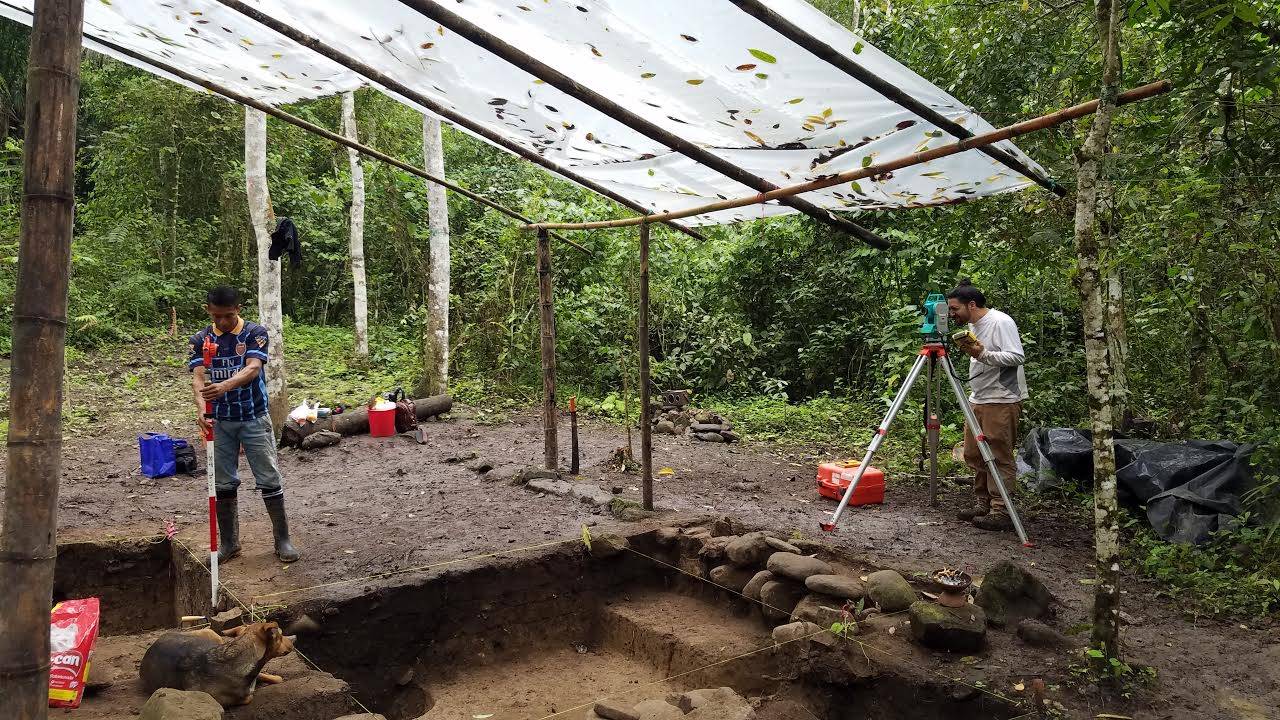
Pursuing a Ph.D. in Geosciences, Andrés Garzón-Oechsle works with faculty member Erik Johanson, Ph.D., in the Environmental Change Lab. Previously, he received a B.A. in Anthropology at Indiana University and an M.A. in Anthropology at FAU. Andrés' research involves understanding the magnitude and intensity of past human occupations in the cloud forests of Manabí in coastal Ecuador.
Andrés Garzón-Oechsle is pursuing a Ph.D. in Geosciences. He works with faculty member Erik Johanson, Ph.D., in the Environmental Change Lab. Previously, he received a B.A. in Anthropology at Indiana University and an M.A. in Anthropology at FAU.
Why did you choose Geosciences?
Geosciences was a natural transition for me from Anthropology as I mainly look into past human-environment interactions through the material culture left behind. Doing my master’s in anthropology/archaeology, I found myself using many of the methodologies and knowledge from the geosciences so it was a good fit.
What are your research interests?
For the last six years, I have been performing research and working for the Florida Atlantic University Anthropological Fieldschool in Ecuador. Our research involves understanding the magnitude and intensity of past human occupations in the cloud forests of Manabí in coastal Ecuador. We have uncovered hundreds of ancient settlements belonging to the Manteño civilization (900–1600 CE) under the thick canopy of the forest in areas that were thought to have been uninhabited or just lightly occupied. This discovery has merited new approaches so I am looking to implement UAV based laser scanning known as LiDAR to virtually remove the canopy and get a true understanding of the entire modified landscape, not just the residential areas. Complimentary to this, I want to perform microcharcoal particle analysis of column sediments from these landscape modifications, such as agricultural terraces, to understand the role of fire in agriculture of the Manteño in the cloud forest. Finally, this information will allow for a better understanding of how the Manteño managed to accommodate and feed thousands of people in an environment that today is seen as wild and inhospitable.
What do you like best about being at FAU and pursuing geosciences here?
For me, the greatest thing about being in FAU is the openness and willingness of many professors and departments to come together to facilitate my research. My project can be considered a collaborative project between three departments, two laboratories, and multiple professors. In Geosciences I have the ability to perform charcoal analysis in the Environmental Change Lab with the mentoring of Dr. Erik Johanson. In the Anthropology Department, I have the support and mentoring of Valentina Martinez and Dr. Micahel Harris who run the Fieldschool in Ecuador, which provides me with the installations, students, locals and laboratory for the field portion of the research Finally, I have been closely working with Dr. Sudghar Nagarajan in the Geomatics department for over a year to improve on his drone-based laser scanning system with the goal of applying it in the cloud forest.
What career are you interested in pursuing after you graduate?
After graduating I would like to remain in academia either in the U.S. or in Ecuador with the goal of continuing my research in the region and continuing the operation of the field school. Long-term I would like to be part of a process of creating a new generation of researchers from Manabi since ultimately they are the stewards of their fantastic and proud past.
Student Spotlight with Kaitlin Waite
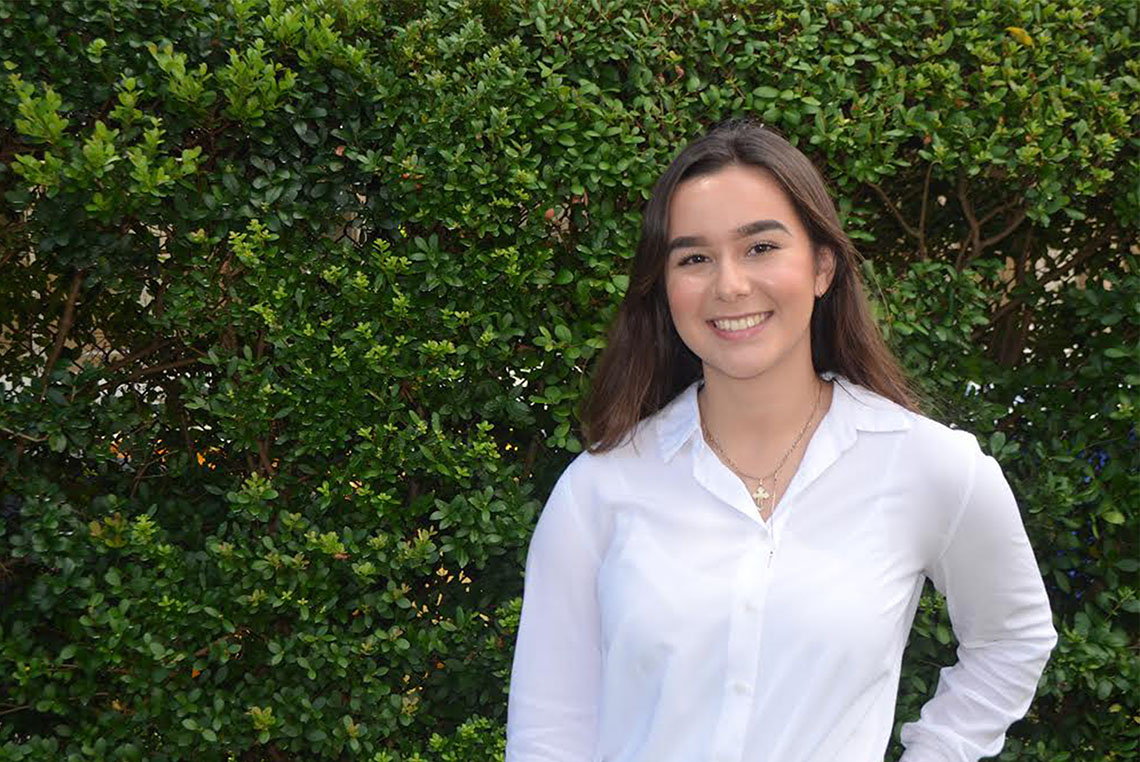
Pursing a B.S. in Neuroscience and Behavior and a B.S. in Biological Sciences, Kaitlin Waite works with Howard Hock, Ph.D. in the Undergraduate Vision Laboratory. Kaitlin's current research project for her Psychology Honors Thesis focuses on the perception of motion and speed in the visual system and how cortical brain damage can affect these responses.
Kaitlin Waite is pursuing a B.S. in Neuroscience and Behavior and a B.S. in Biological Sciences. She works with Howard Hock, Ph.D., in the FAU Undergraduate Vision Laboratory.
What are your research interests? What research or scholarly pursuits are you currently pursuing?
My current research interests focus on the perception of motion and speed in the visual system and how cortical brain damage can affect these responses. I am currently completing my Psychology Honors Thesis in this subject and plan to complete it in Spring 2020.
What do you like best about being at FAU?
I love all of the friends I've made at FAU and all of the organizations I've joined here during my undergraduate career! I have held leadership positions in the American Medical Student Association for three years now directing pre-medical mission trips, and in Pre-Health Ambassadors for two years organizing Pre-Health Professions Week, and wouldn't trade the experience for the world.
What career are you interested in after you graduate?
I am currently planning on receiving a master's in biomedical science, and then medical school to become a doctor. Currently, I don't have any preference when it comes to what kind of doctor I would like to be, but my interests are in OBGYN and Ophthalmology.
Student Spotlight with Amaury Miniño
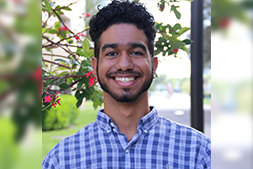
Pursuing a B.S. in Mathematics with honors and a minor in Economics, Amaury Miniño works with Assistant Professor, Pamela E. Harris, Ph.D., in continuation of his summer Research Experience for Undergraduates. Amaury's current research project involves studying Kostant's weight multiplicity formula for the exception Lie algebra of type G2.
Amaury Miniño is pursuing a B.S. in Mathematics with honors, and a minor in Economics. He works with Dr. Pamela E. Harris at Williams College, in continuation of his summer Research Experience for Undergraduates.
What are your research interests? What research or scholarly pursuits are you currently pursuing?
My research interests lie in algebra, and in particular combinatorial approaches to solving algebraic problems. I am currently researching Kostant's weight multiplicity formula for the exception Lie algebra of type G2. This research has been submitted for publication, and I plan on continuing to study the use of combinatorics in solving problems.
What do you like best about being at FAU?
I truly love the sense of community and family that I have developed during my time here. Before starting at FAU, I viewed mathematics as a tool to use in my life. In pursuing mathematics, I have grown to love and appreciate all that beauty that mathematics has to offer.
How are you involved at FAU?
I currently work at the Math Learning Center (MLC) as a Learning Assistant (LA) for Calculus 2. I have been working at the MLC for over two years now, as both an LA and a tutor. Additionally, I re-established the Math Club at FAU and served as the President for two years. I recently stepped down from my E-board position to allow new students to continue organizing the club, which has allowed me to see the work that I put into the club continue on without my direct involvement.
What career/or graduate degree are you interested in pursuing after you graduate?
I have been accepted into Colorado State University for their Ph.D. program in mathematics, and Florida State University for their Ph.D. program in pure mathematics.
Student Spotlight with Morgan Slevin
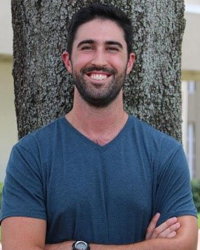
Pursuing his doctorate in Integrative Biology and Neuroscience, Morgan Slevin works with Assistant Professor, Rindy Anderson, Ph.D., in the Behavioral Ecology and Bio-acoustics Lab. Morgan's current project at FAU aims to help understand the relationship between a bird's gut microbiome, its brain, and its overall health. Read more about Morgan at science.fau.edu.
Morgan is pursuing his doctorate in Integrative Biology and Neuroscience. Morgan works with Assistant Professor, Rindy Anderson, Ph.D., in the Behavioral Ecology and Bioacoustics Lab.
What are your research interests?
I am interested in behavioral ecology and ornithology. My current project at FAU is aimed at better understanding the relationship between a bird's gut microbiome, its brain, and its overall health.
What do you like best about being at FAU?
For me, it's personal. I was born on the west coast of Florida and grew up loving the state and its natural side. After working around the country and even in other countries and hemispheres, it's very satisfying to come back to my home state near my family and work with the wildlife here, especially given the fact that my research is aimed at better understanding and improving wild animal health. I feel like my research will be able to give back to my state one day.
What career are you interested in after you graduate?
I'm interested in becoming a research professor after I graduate, but I may shift that goal to leaving academia and working for a non-profit or the government so I can focus more easily on starting a family. As long as I keep getting to do research, and hopefully teach too, I'll be content with my career.
Alexandrea DeCesare, Student Spotlight
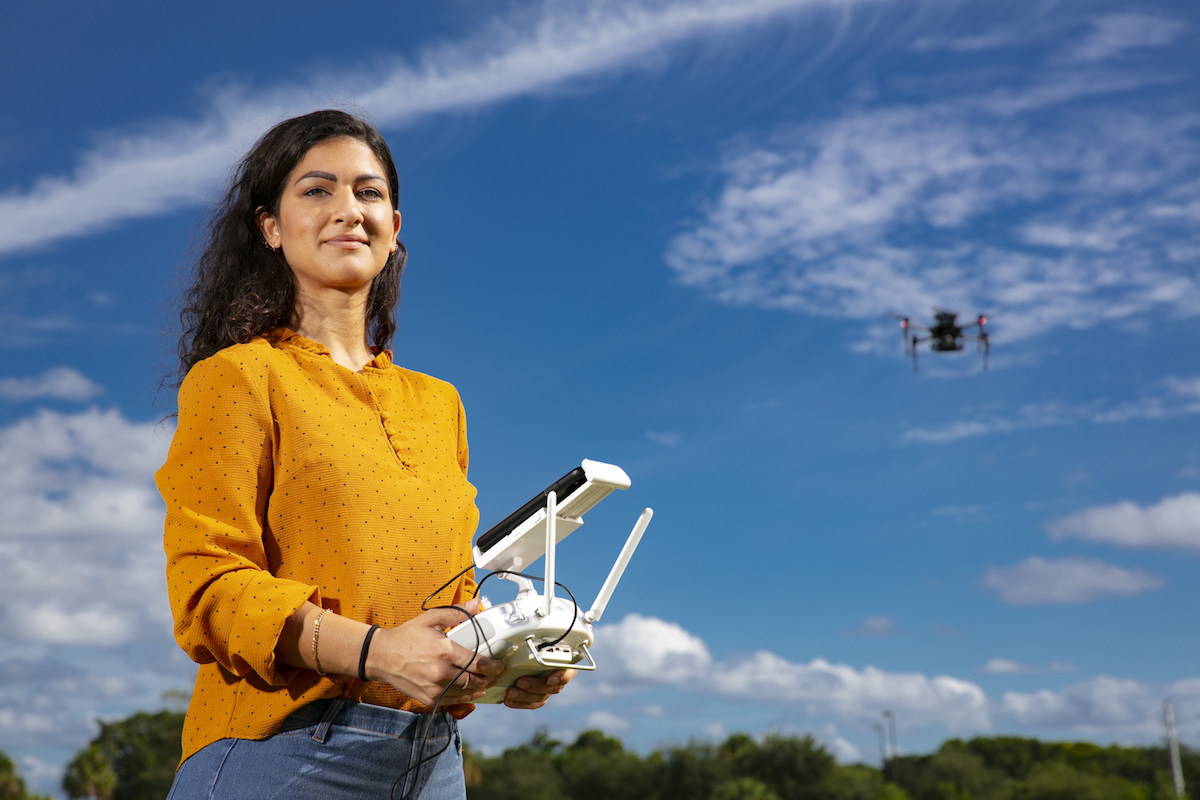
Pursuing a B.S. in Physics, Alexandra DeCesare, goes into detail about her research, her experience at FAU as a physics student and more in this recent Q and A.
Tell us about yourself, Alexandra.
I’m Alexandra DeCesare, I’m pursuing a B.S. in Physics and I am part of the Quantum Optics Lab with Professor Warner Miller, Ph.D. I’m also working alongside Associate Professor, Elan Barenholtz, Ph.D., in the Machine Perception and Cognitive Robotics (MPCR) Lab.
What are your research interests?
My research interests include quantum information and communication, quantum optics, robotics, and machine learning. I am the team lead for the Quantum Drone team where we are developing specialized quantum nodes (the drones) as means for distributing quantum keys generated for use in quantum communication and cryptography. I am also a team lead on the MPCR Robotic Olfaction team where we are exploring ways to integrate machine learning and agricultural techniques to advance the technology of precision livestock farming.
What do you like best about being at FAU?
FAU offers so many resources for students interested in STEM fields. I feel they make it easy to either get involved or move forward with groundbreaking research. I also enjoy being a part of the Physics department, and I am lucky to have the opportunity to work closely with all of my classmates and professors.
What career are you interested in after you graduate?
I plan to work in research and development for the U.S. Department of Defense or a defense contractor and eventually go to graduate school.
Kate Galloway, Ph.D. Candidate
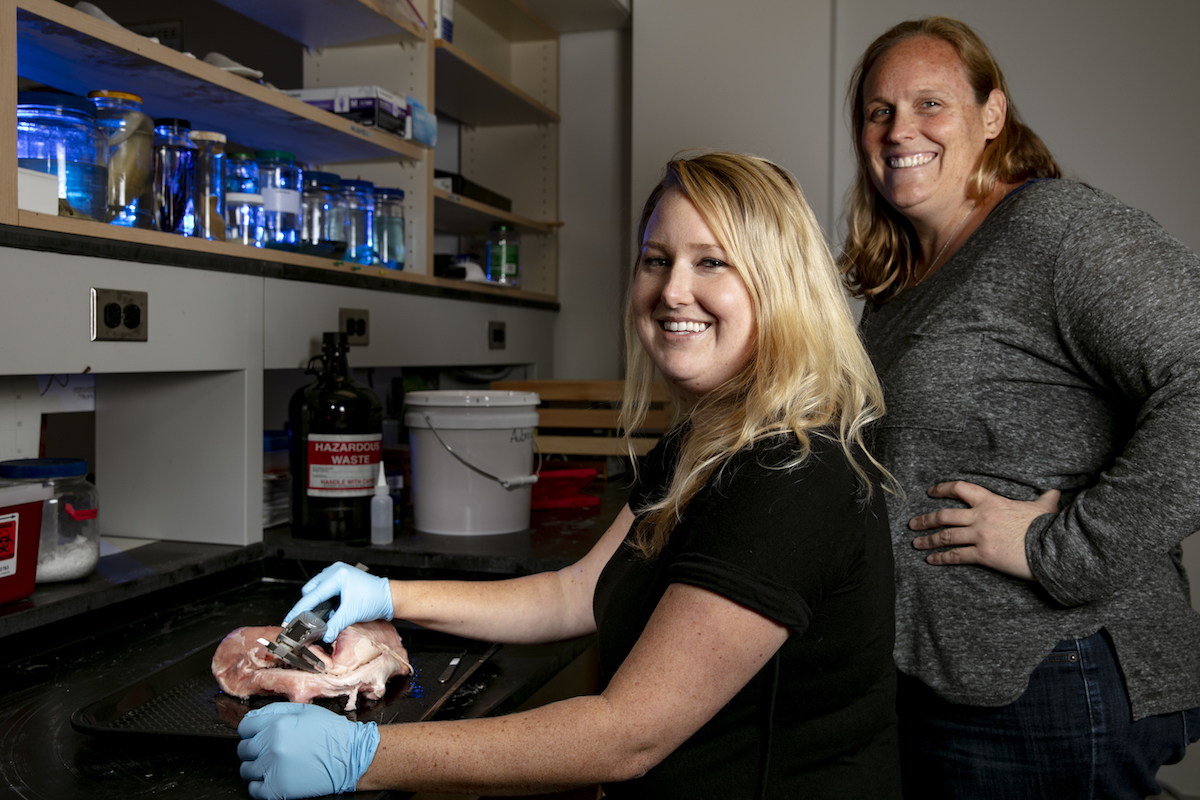
Ph.D. candidate in Integrative Biology, Kate Galloway, goes into detail about her research, her experience at FAU as a biology student and where you can find her exhibit on lionfish in this recent Q and A.
Ph.D. candidate in Integrative Biology, Kate Galloway, goes into detail about her research, her experience at FAU as a biology student and where you can find her exhibit on lionfish in this recent Q and A.
Tell us about yourself, Kate.
Hi, I’m Kate Galloway. I’m a Ph.D. candidate in Integrative Biology Student who studies lionfish and other bony fish in Dr. Marianne Porter’s biomechanics lab. I earned my master’s along the way (Master’s in Biological Sciences) here at FAU and my undergrad degree in marine biology from U.C. Santa Cruz in California.
What about lionfish do you study?
I study the mechanical properties of lionfish spines, including their puncture performance on the skin of different predators that occasionally consume lionfish, like grouper and sharks.
And I also test and compare the performance of their spines against hypodermic needles - a biomimetic comparison. I do this by puncturing pig skin. I found that lionfish spines exhibit a greater force to puncture the skin, but they are also larger than a hypodermic needle. In the future, we would like to use a 3D printer to scale down the spines in size and print them in resin to test the performance at a similar dimension as the man-made needle.
I’m also studying the head morphology of lionfish, their spiny, bony plates. I recently submitted a paper with an undergraduate researcher, Delaney Frazier, on the topic. Not much is known about the native lionfish biology and morphology, and even less is known about the invasive species we have here in Florida. They have no significant natural predators here to put a dent in their population with how fast they can reproduce. Regardless of this, the larger they grow, the more robust their head armor gets.
What are their natural predators in the native environment?
Sharks,groupers, and eels generally eat them in areas where they are naturally found, such as Australia and the Indo-Pacific. And some of those species will eat them in Florida, however, sharks in Florida don’t recognize them as a significant food source.
Why are lionfish so pervasive in Florida?
They reach sexual maturity quickly, they reproduce fast, and one fish can lay two million eggs per year. The currents take the lionfish larvae and carries the eggs for countless miles, depositing them across oceans. And with no significant natural predators, we mainly rely on spearfisherman to help control the populations.
Are lionfish safe to eat?
Yes. People are scared to eat them, but they are perfectly safe to consume. There’s a difference between a venomous fish and a poisonous fish. Only their spines are venomous, the flesh is safe and is NOT poisonous, like a pufferfish
What do you like about FAU?
There’s a lot of support here that I didn’t experience at other schools. This includes my committee members, other faculty, and the Biology Department staff. Someone is always there to help.
Tell us about your exhibit at Gumbo Limbo Nature Center in Boca Raton.
I worked with the Florida Fish and Wildlife Conservation Commission and Gumbo Limbo Nature Center to create an interactive wall exhibit. You can feel the spines of a lionfish - we placed some spines in a resin cast. You can also see some lionfish that have been cleared and stained, so the fish no longer has any pigmentation and their bones are dyed and also illuminated so you can view the skeletal biology of the fish. It has been a long time in the making.
How can we support your research?
You can find lionfish bracelets, earrings, and bracelets on my Etsy store. I use lionfish fins that I otherwise would discard, which have a unique pattern and color, and incorporate them into custom pieces that are for sale on my Etsy site: https://www.etsy.com/shop/FishgirlFashion.
Kaitlin Grell, Biological Sciences Alumna
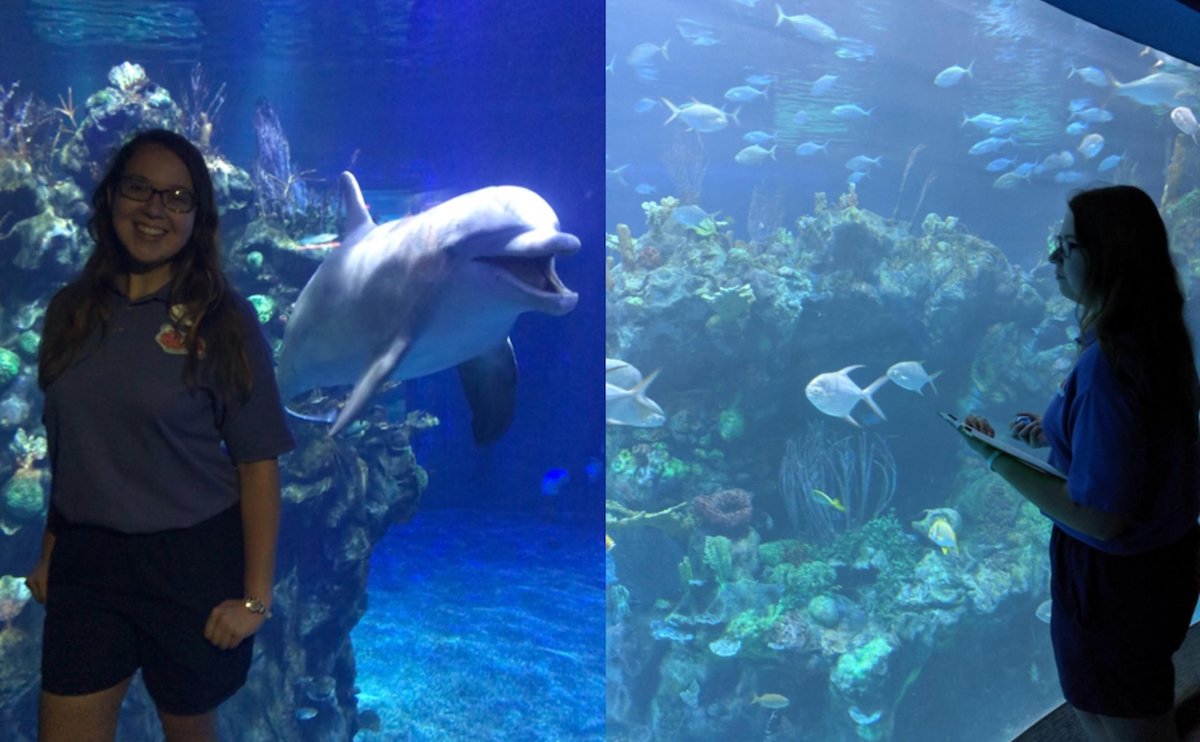
Kaitlin Grell earned a B.S. in Biological Sciences and an Environmental Science certificate from FAU in May of 2019. About a month after she graduated from FAU, and started work with the Walt Disney World Company as an Aquatic Research Intern at the Seas with Nemo & Friends.
My name is Kaitlin Grell and I earned a B.S. in Biological Sciences and an Environmental Science certificate from FAU in May of 2019. About a month after I graduated from FAU, I started work with the Walt Disney World Company as an Aquatic Research Intern at the Seas with Nemo & Friends! I have worked on several ongoing projects while part of the Seas Science Team, including daily animal observations, coral growth analysis, and nanobubble treatment analysis. However, my absolute favorite part of this position is doing research with Disney’s dolphins! Our team conducts a lot of cognitive research with our dolphins, trying to understand the different ways that they think and perceive their environment. One project we have worked on is a fish identification match, attempting to see if the dolphins can distinguish videos of different fish species from one another, at which they have proven to be very successful! My current individual research project at the Seas involves assessing dolphin/human window interactions during various times of the day using a variety of enrichment devices.
My time at FAU helped prepare me for my current position in many ways, especially as I focused on marine biology-related coursework and research. Harbor Branch Oceanographic Institute’s Semester by the Sea program introduced me to the heavy course and lab work that has proven to be very useful in my professional career. My research experiences as part of the Harbor Branch Dolphin Research team for three years and as part of Dr. Sarah Milton’s sea turtle lab for two years have also proved to be a vital part of my current success. Without the knowledge and skills, I gained in these labs, I would not be where I am today, and would have never learned how much I love pursuing aquatic research! For any undergraduate looking to pursue a career in the marine biology field, my advice to them would be to volunteer in a lab and/or a local aquarium, wildlife facility, or animal shelter – your past lab and animal experience as an undergrad is what will really set you apart in your future endeavors!
Jacqueline Stotler, Ph.D. Candidate
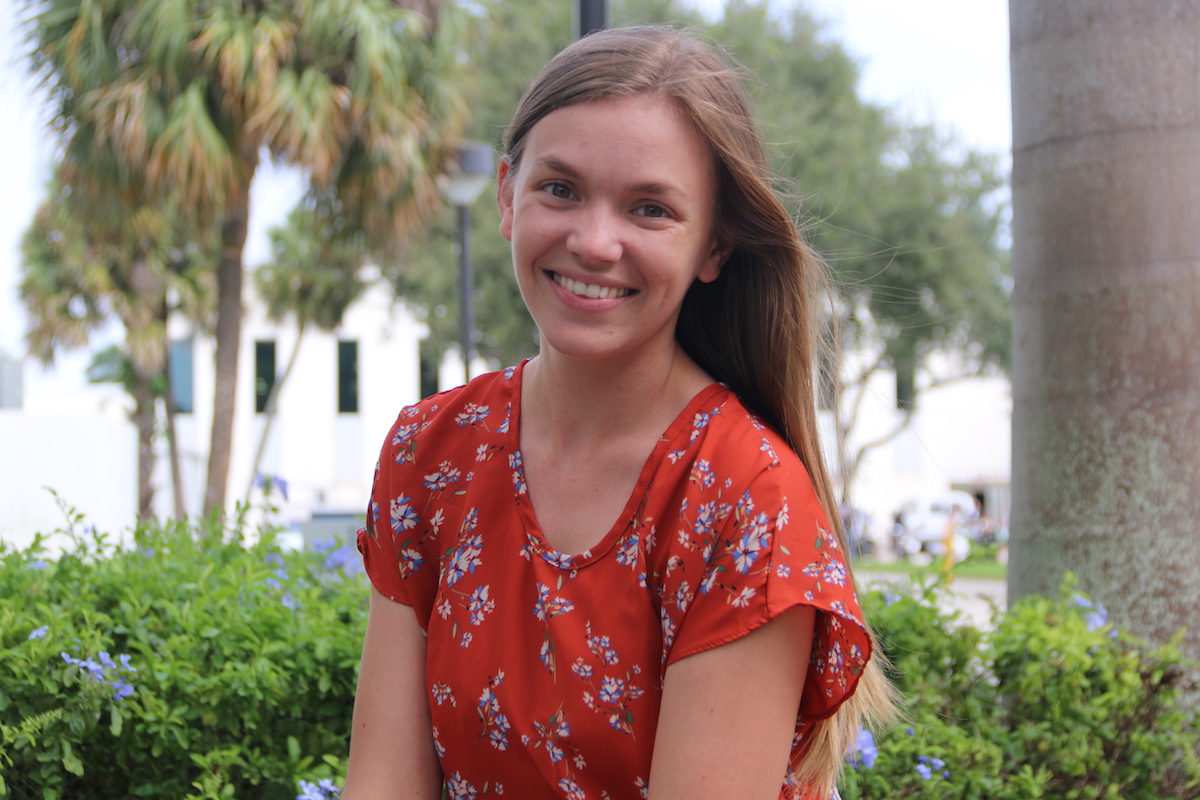
Ph.D. candidate in Experimental Psychology, Jacqueline Stotler, goes into detail about her research, her experience at FAU as a psychology student and her pursuits for after graduation in this recent Q and A.
What degree are you pursuing here at FAU?
I am working towards a Ph.D. in Experimental Psychology, with a Developmental Concentration. I am in my second year of a five-year program, earning my master's along the way. I will have my master's in Experimental Psychology in Spring 2020, and ideally will graduate from my doctoral program in Spring 2023.
What lab are you working and who is your advisor?Right now I'm the lab coordinator for the Infant Cognition Lab; my advisor/lab director is Dr. Teresa Wilcox.
What are your research interests?Our lab is interested in infant perception and cognition. We're interested in the development of social cognition, so we're investigating infants' processing of emotional facial expressions, infants' comprehension and production of nonverbal communicative gestures, and infants' ability to use information provided by a social informant versus a mechanical informant. Thanks to a collaboration with Dr. Erik Engeberg in Mechanical Engineering, we're also attempting to assess infants' perception of anthropomorphic (human-like) robotics. Our lab uses eye-tracking technology to measure behavioral responses to static and dynamic stimuli, and we also collect neuroimaging data using fNIRS (functional near-infrared spectroscopy), which allows us to identify areas of the infant cortex that are active in response to stimuli.
What do you like best about being at FAU?I really like the work environment; everyone is very kind!
What career are you interested in after you graduate?I would like to work at a non-profit organization or medical institute conducting research with special populations of infants (at-risk for autism, infants born with drug addiction, infants with developmental delay, etc.).